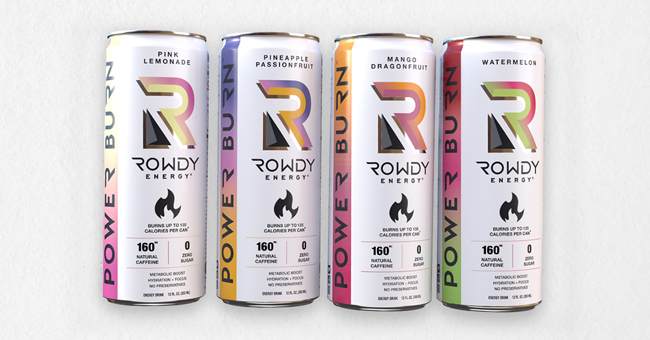Within an energy drink category packed with competition, Rowdy Energy has managed to find a lane, offering an all-natural, better-for-you product with broadly appealing fruit flavors. With the release of its first line extension, Rowdy Power Burn, the brand is aiming to diversify both its consumer base and retail presence, while giving it a lifestyle focus.
Speaking with BevNET today, Rowdy CEO Jeff Church, who co-founded the brand with NASCAR star Kyle Busch in 2020, following Church’s departure from Suja Juice, said the brand invested in clinical trials in order to back up its claim that drinking Power Burn can help consumers burn 150 calories per 12 oz. can (the drink itself contains 5 calories). The four-SKU line — available in Watermelon, Pineapple Passionfruit, Pink Lemonade and Mango Dragonfruit — swaps out the Allulose from the core formula in favor of green coffee bean extract, Guarana, L-Citrulline, L-Arginine and L-Glutamine. Power Burn is launching exclusively with 7-Eleven this month before launching online in the coming weeks.
Similar to how brands like Celsius and Alani Nu have successfully courted female consumers into the energy category over recent years, Church said Power Burn would also be primarily targeted towards women aged 25 to 45 with its smaller 12 oz. format and slightly less sweet flavor. The brand is in discussions to bring on a celebrity ambassador to help build its awareness with women by next week, he added.
Along with expanding its audience and occasion, Power Burn is expected to serve as Rowdy’s more premium-positioned entry relative to the 16 oz. core line, with both carrying a $2.99 suggested retail price. After surpassing $1 million in revenue in its first year, Rowdy did around $11 million last year and is set to hit the $20 million mark this year.
Power Burn also represents an evolutionary step for the Rowdy brand. Church noted that Busch’s high profile with racing fans and large following on social media helped Rowdy get off the ground, but now the company is looking to balance that ‘everyday’ proposition of its core line with the lifestyle and fitness appeal of Power Burn, which can play at supplement-focused channels like GNC and Vitamin Shoppe.
Those gains will continue to come from broadline distributors, as Rowdy has sought to concentrate on proving out the concept at chains like 7-Eleven and Kwik Trip and CVS before seeking out DSD partners. Church said the brand has room within those partners to roughly double its existing store count of 25,000, and is backing up those efforts by spending “well above” the typical 10% to 20% range of revenue on marketing. Right now, around 70% of total sales come from c-stores, with 10% coming from ecommerce channels. In grocery, where Rowdy counts Giant and Stop & Shop as retail partners, growth has been slower with the product limited to single cans on ambient shelves rather than the cold case.
Winning authorizations and driving velocities will help give Rowdy leverage when it sits down with potential DSD houses in the future, he noted, while the product’s better-for-you credentials gives it some separation from other energy drinks that distributors may already carry.
“Ultimately, we will go through DSD because if you want to play at Target or Kroger or big retailers like that, you kind of need to be DSD from a shelf management standpoint. But until you get to a point where you’re got authorizations to be able to bring to these [distributors] – until you have the authorizations with the retailers you’re not really the ‘it’ brand so you don’t get the attention. So we really focused on going through broad liners in the beginning just from a profit management standpoint, and then are building the authorizations over time so that as we do go to them next couple years, now we’ve got some leverage [in negotiations].”
The brand is backing those ambitions with new funding; after closing a $13 million angel round last March, Church said Rowdy is in the process of raising its first Series A round priced at between $10 to $15 million, that is set to close in the coming months. Church said he’d quoted Busch a target of raising between $30 to $40 million to get Rowdy into the black, and it’s about halfway there.
Though nothing has been confirmed, Church also teased that, after releasing a 12 oz. product, Rowdy could look to go even smaller in the future.
“If we think about our innovation platform, we really like to have different size constraints with the 16 oz. being the value proposition and the 12 oz. [Power Burn] being priced the same at $2.99,” Church said. “Our philosophy is that, because it’s all natural, our COGS are a little bit higher than typical energy drinks with all the artificial stuff that tend to be pretty commoditized, so we tend to want to price the product 10 to 20 cents above where a Monster or a Bang might be. But as we think about innovation platforms, I think about also having another smaller platform size, maybe a better-for-you type 2 oz. shot.”
